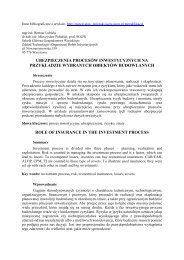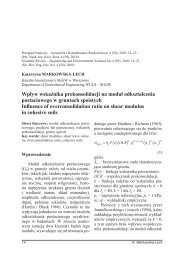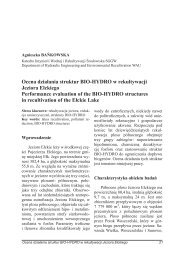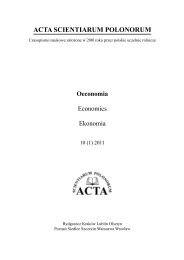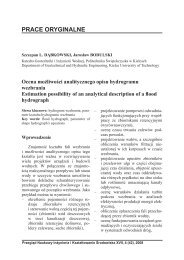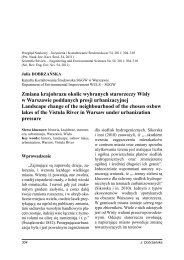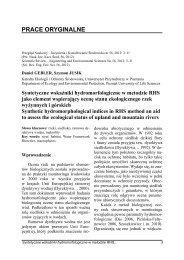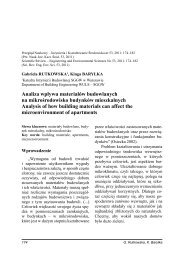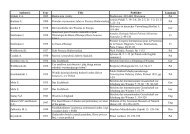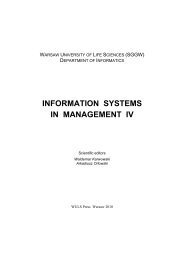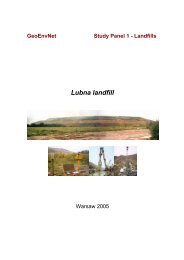Acta Scientiarum Oeconomia 9 (1)
Acta Scientiarum Oeconomia 9 (1)
Acta Scientiarum Oeconomia 9 (1)
You also want an ePaper? Increase the reach of your titles
YUMPU automatically turns print PDFs into web optimized ePapers that Google loves.
58<br />
M.A. Geheder, M.S. Moussa, E.R. Shnibesh, A.A. Yousef<br />
CONCLUSIONS<br />
In this paper econometric estimation of Libya’s imports from the EU as the main<br />
partner for Libya’s foreign trade has been performed. To improve the degree of accuracy<br />
of the estimated results, the unit root test was conducted. The cointegration approach was<br />
followed in order to determine the number of cointegrating equations. The estimation<br />
procedure was based on long-run equilibrium of Libya’s import function from the EU<br />
countries. The estimated model was meaningful and statistically significant, and the<br />
most prominent factor in determining imports appears to be GDPG. Whereas, the next<br />
most important factor determining imports was found to be the real exchange rate, which<br />
effectively reduces the costs of imported goods.<br />
The findings have shown that the perspective of free trade will however strongly<br />
enhance the pressure to pursue courageous domestic reforms in Libya in terms of a<br />
market-oriented re-allocation of the huge capital resources. Since the Libyan human<br />
resource capacities are still too small to absorb the capital economically in building up a<br />
modern and diversified economy, a far-reaching re-structuring and privatisation as well as<br />
enhanced economic co-operation in terms of FDI and business co-operation needs to be<br />
boosted very soon. An overall improvement of economic co-operation in terms of clear,<br />
fair and reliable mutual agreements, market-oriented reforms, legal security and a further<br />
encouragement of EU originated FDI in Libya will probably contribute to diversification<br />
and productivity improvements in Libya by incentive and further positive external effects.<br />
Surplus export earnings (from oil) ought to be invested abroad (notably the EU) in sectors,<br />
where important knowledge spillovers for Libya (technology transfer) can be reaped.<br />
Due to the less advantageous starting conditions compared to North African countries,<br />
which their economies are more competitive in international trade, it is likely that the<br />
efforts of Libya need to be much more courageous. For Libya’s pursuit of economic<br />
development, a free trade agreement supporting further economic cooperation through<br />
the Euro-Mediterranean Process and suggest the need for trade agreement with the EU.<br />
REFERENCES<br />
Al Dakhil K. and Al Yousef N., 2002. Aggregate Import Demand Function for Saudi Arabia: An<br />
Error Correction Approach, King Saudi University, Riyad. Journal of Economic & Administrative<br />
Sciences, 18, 83–100.<br />
Central Bank of Libya, annual reports, 1995–2007, various issues, Tripoli, Libya.<br />
Derwish B.M., 1997. An analysis of investment Motivations, Strategic Posture, and Performance of<br />
Libyan companies Aboard, Ph.D. thesis, University of Bradford.<br />
Dickey D.A. and Fuller W.A., 1981. Likelihhod Ratio Statistics of Autoregressive Time Series With<br />
a Unit Root, Econometrica, Vol. 49, 1057–1072.<br />
Dickey D.A. and Fuller W.A., 1979. Distribution of the Estimators for Autoregressive Time Series<br />
With Unit Root, Journal of American Statistical Association, Vol. 74, 427–431.<br />
Dolado J.J., Gonzalo J. and Marmol F., 1999. Cointegration. Depatment of Economic, Statistics and<br />
Econometrics, University Carlos III de Madrid, Spain.<br />
Doroodian K., Koshal R. and AL-Muhanna S., 1994. An Examination of the traditional Aggregate<br />
Import demand function for Saudi Arabia, Applied Economics, Vol. 26, Number 9 (September),<br />
909–915.<br />
<strong>Acta</strong> Sci. Pol.




